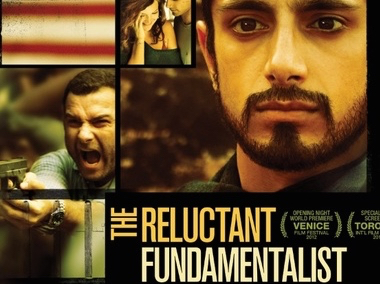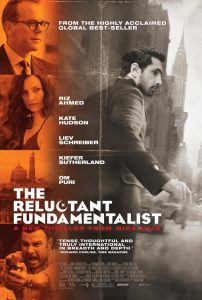The Reluctant Fundamentalist
(Mira Nair, 2013)

In our globalized and pluralistic world, opposing views of life and reality can collide, resulting in distrust, and even, sadly, violence. How I see my neighbor is not insignificant, and has ripple effects that flow out in all sorts of ways, for blessing and for curse. And my view of them is shaped in part by their view of things or my perception of their view, which is of course always partial and incomplete even in the best of circumstances.
Whether we are aware of it or not our view of things flows out of fundamental ideas and values that we accept as right and obvious. A capitalist on Wall Street assumes that in business the bottom line is a good return for the shareholders, regardless of how many workers need to be fired in the process. A CIA operative assumes that rescuing a kidnapped agent is so obviously necessary that threatening the innocent family of an informant is a necessary if unfortunate part of the cost of conducting espionage in a dangerous world. A terrorist assumes that since the oppressors of his people cannot be repulsed by military force, only acts of random violence will drive them away.
 Things get complicated—and potentially dangerous—when people must make life changing choices based not merely on their own fundamental convictions but also on what they perceive as another person’s view of things. We watch our neighbor, conclude what their views must be, and then act, forgetting or ignoring that what we have seen of them may be only a part of their story. In little ways all of us indwell this reality in our neighborhoods, our workplace, and in the public square. We dislike someone for their political views even though we’ve never talked with them about it, or think our Eastern Orthodox workmate must not be a true believer because they venerate icons. The list could go on.
Things get complicated—and potentially dangerous—when people must make life changing choices based not merely on their own fundamental convictions but also on what they perceive as another person’s view of things. We watch our neighbor, conclude what their views must be, and then act, forgetting or ignoring that what we have seen of them may be only a part of their story. In little ways all of us indwell this reality in our neighborhoods, our workplace, and in the public square. We dislike someone for their political views even though we’ve never talked with them about it, or think our Eastern Orthodox workmate must not be a true believer because they venerate icons. The list could go on.
In the world of terrorism and espionage, however, the results can be fatal, for individuals, for families, for communities and potentially for entire nations. This is the story explored by The Reluctant Fundamentalist.
I use the word explored intentionally—The Reluctant Fundamentalist doesn’t simply tell this story, it explores it. The film is designed to allow us watch a story unfold, but from the point of view of several characters. Director Mira Nair constructs her film in a way that does not allow us to sit back passively and allow the story to simply be told. Instead, she uses several creative cinematic techniques to keep us wondering: partial scenes for which we are given more detail later in flashbacks, multiple subplots unpacked simultaneously, and allowing the film to display differing—even opposing—perspectives of the same thing by different characters. Nair draws us into the story, plays with our imagination and requires us to commit ourselves, producing a spy thriller that is both satisfying and unsettling.
The Reluctant Fundamentalist is satisfying because it is a story that engages us, and because it provides a deeper glimpse of the human condition that lies behind the headlines in the news. It is unsettling because it forces us to face our own frailty in how we view our neighbor, and reminds us that reality is never neat and tidy, but messy and broken.
The Reluctant Fundamentalist may not be remembered as one of the great films of all time, but those who take the time to fulfill its demand to be discussed will be better for it.
Credits for The Reluctant Fundamentalist
Starring:
Riz Ahmed (Changez)
Liev Schreiber (Bobby Lincoln)
Kate Hudson (Erica)
Kiefer Sutherland (Jim Cross)
Om Puri (Abu)
Director: Mira Nair
Writers: Javed Akhtar (eulogy in Urdu), Ami Boghani (screen story), Mohsin Hamid (novel & screen story), William Wheeler (screenplay)
Producers: Ami Boghani, Hani Farsi, Lydia Dean Pilcher and others
Cinematography: Declan Quinn
USA, 2013, 130 minutes
Rated R (language, some violence and brief sexuality)

